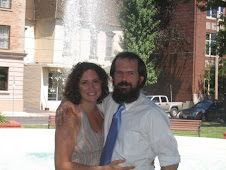After being out of commission with my first NYC cold I'm finally getting back on my feet. Unfortunately, it means I haven't had a chance to write another post... so instead I'll be sharing the wonderful input of our dear friend Ben.
In response to my "OMG I'm going to DM!!" post Ben sent an e-mail with some guidance, and I thought it would fit well into the flow as I develop as a Dungeon Master. Unfortunately for my victims... uhh, I mean "players" (hee hee) I didn't receive his e-mail before we played on Saturday (I'll explain later). For now, here you go:
I've been pondering what nuggets of juicy wisdom I can add to what John would tell you about GMing. The first detail that I thought you might not have stressed is that DnD4e has just about every conceit that the theater has. The action is broken down into scenes and acts with a very specific structure for how the action is resolved. While there is nothing wrong with this, and in fact much that is good about it, there are other ways to operate. It is possible to instead conduct the action in a more literary fashion where the primary motivation for playing is developing the characters. This is more akin to what White Wolf games (Vampire, Werewolf, Exalted) try and do. These other games take longer to play since you don't just race to the boss fight and kill as fast as you can. And they also take a different priorities amongst the players and GM.
The other detail that John may well have mentioned but I feel it good to bring up. I, for one, find the best antagonists to be intelligent beings doing what we would consider reasonable if the story were told from their point of view. Like the old Wizard trying to achieve immortality. Our only gripe with him is the collateral damage caused by the ritual. It makes the moral life of the characters more than just words on the page. Again these are harder to motivate and pull together for one-shots and are better suited to a campaign.
Lastly, don't just give experience for what the book tells you to. Do your characters only learn and grow from killing things or set piece skill challenges? The point of the game is to have fun and tell a good story. Whatever helps that gets experience.
Tuesday, September 22, 2009
Subscribe to:
Post Comments (Atom)


No comments:
Post a Comment